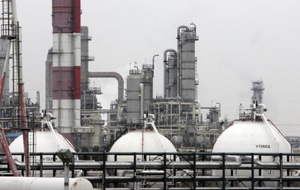S.Korea's SK Energy buys 1st US crude oil in move away from Middle East
ULSAN, South Korea (Reuters) — South Korea's top refiner SK Energy is buying its first-ever continental US crude oil shipment as producer club OPEC's output cuts raise MidEast prices, giving other suppliers a chance to compete for the world's juiciest oil market—Asia.
One of Asia's biggest fuel importers, SK Energy said it will import 1 MMbbl of US WTI Midland crude in mid-October. The oil will be processed at its 840,000-bpd refinery in Ulsan, about 250 mi southeast of Seoul, showcased in a recent media tour.
The order is dwarfed by SK Energy's overall oil needs of 270 MMbbl/yr, mostly supplied from the Middle East. But it comes as big players in Asian oil imports snap up more US crude since the Organization of the Petroleum Exporting Countries (OPEC) pledge to rein in output through March 2018 to drain a supply glut and prop up prices.
"Light crude oil has become more economically viable than before and by importing light crude from Kazakhstan, US and Mexico, it helps us boost profits and diversify sources," said Kim Woo-kyung, spokeswoman at the conglomerate SK Innovation Co which owns SK Energy.
Kim said the refiner is also buying more from Mexico and Kazakhstan. "We have decided to import as well 1 MMbbl of Mexico's Isthmus crude," also to arrive at Ulsan in October, she said.
SK Energy received a total of 2 MMbbl of Kazakhstan CPC crude for arrival in late July and early August, Kim said.
Continental US oil exports to South Korea have become more frequent since the United States in 2015 relaxed crude export rules, and have been spurred since the OPEC curbs were announced: GS Caltex, South Korea's No.2 refiner, said last month it bought a total of 3 MMbbl of US crude for August–October delivery.
NARROWING BRENT-DUBAI SPREAD
Korean refiners have long been eager to gradually diversify their crude slate in an attempt to reduce heavy dependence on the Middle East. While MidEast crude imports made up 83.7% of total overseas orders in the second quarter, that was down from 86% in the same period a earlier year, according to data from Korea National Oil Corp (KNOC).
On top of increasing oil flows from North America, South Korean refiners had stepped up purchases of Brent-related crude from the North Sea, as well as Africa.
The narrowing spread between Brent crude and Dubai crude made the Brent-linked crude grades more attractive to Asian buyers as it remained below $1/bbl for three months from April, although it widened nearly $1/bbl in July on stronger demand.
Lee Chung-hwan, manager at the Ulsan Maritime Agency that oversees arrival and departure of oil tankers in Ulsan, said the types of crude cargoes had increased this year, now also including Kazakhstan's Caspian Pipeline Consortium (CPC) blend.
"Kazakhstan CPC crude used to come once or twice a year, but so far this year, SK Energy has brought in Kazakhstan CPC crude four times," Lee said.
As oil trickles in from the new sources, analysts say change in the overall structure of supply will be gradual.
"Various crude oil supplies will keep coming little by little in the long-term," said Lee Dal-sok, senior research fellow at state-run Korea Energy Economics Institute.
Reporting by Jane Chung; Editing by Henning Gloystein and Kenneth Maxwell







Comments